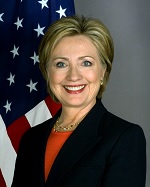 |
| Presidential candidate Hillary Clinton |
Hillary Clinton has already taken aim at the pharma industry during her campaign, revealing plans to crack down on skyrocketing drug prices. Now Clinton is putting more heat on the industry, laying out a new proposal to curb corporate tax inversions weeks after Pfizer ($PFE) announced that it would merge with Allergan ($AGN) to reap the benefits of a lower tax rate.
Clinton's plan would force U.S. companies moving their headquarters overseas to pay an "exit tax," which would tax foreign earnings at the time of the inversion deal. Money raised by the new tax would be funneled into creating new manufacturing jobs in the U.S., The Associated Press reports.
The Democratic frontrunner has "deep concerns" about Pfizer and Allergan's $160 billion megamerger and is asking Congress and regulators to stop similar deals from taking place. "They're doing it to save money on taxes," Clinton said last month, as quoted by the AP. "I want the Treasury Department to do everything it can to stop that kind of behavior and call it for what it is: gaming the tax system."
While Clinton's proposal would apply to any company trying to launch a tax inversion deal, the move comes at a pivotal moment in the pharma industry. A few weeks ago, Pfizer announced it would merge with Allergan to enjoy the perks of Allergan's Irish tax domicile. Pfizer expects that the deal will lower its tax rate--currently the highest in Big Pharma--to between 17% to 18% from the 25% it says it pays now. Ireland's lower corporate tax rate would have saved Pfizer about $1 billion of the $3.1 billion in U.S. taxes it shelled out in 2014, the AP points out.
Still, Pfizer and Allergan could face some pushback along the way as they try to close the deal, especially from the U.S. Treasury. The agency last month said it would roll out new guidance to "deter and reduce further the economic benefits of corporate tax inversions." The move builds on guidelines that the Treasury issued last year to discourage companies from striking those kinds of deals.
One pharma merger was spoiled in the process, with AbbVie ($ABBV) last year nixing its $55 billion deal to buy Ireland's Shire ($SHPG) due to changes that "introduced an unacceptable level of uncertainty into the transaction."
While it can throw up hazards, the Treasury can't block any tax inversion deals without action from Congress, something Pfizer CEO Ian Read kept in mind before the company's recent merger. "You'd rather do (a deal) in a Congress where you do know who are setting the rules and what the rules are," Read said during Pfizer's Q3 earnings call.
Meanwhile, Clinton also is taking the industry to task over price increases. In September, she laid out a plan to curb drug prices that included common themes like giving Medicare the power to negotiate pricing, reducing the exclusivity time for biosimilars and allowing Americans to buy drugs from other countries that have lower prices than the U.S.
- read the AP story
Special Reports: The top 15 pharma companies by 2014 revenue - Pfizer | Pharma's top 10 M&A deals of 2014 - Actavis/Allergan - Actavis/Forest Laboratories